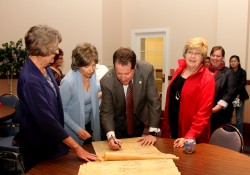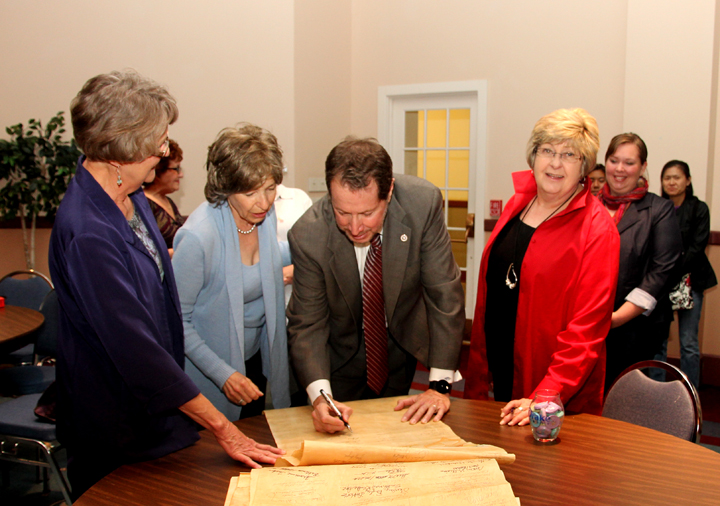For most Americans, the ability to read is a skill that is taken for granted — a skill people rarely imagine their life without.
Low literacy in adults is a hidden but surprisingly large issue in today’s society; in fact, about 93 million American adults read at an eighth grade level or lower, which is considered a lack of functional literacy.

On April 9, Drake University’s Adult Literacy Center worked to draw attention to this issue by helping to bring the Declaration for the Right to Literacy Scroll to Des Moines. President David Maxwell and Madeleine Maxwell, as well as Iowa Governor Terry Branstad, signed the scroll to show their support.
The scroll’s purpose is to emphasize the significance of literacy as the number one tool to facilitate individual change and to impact community-wide economic prosperity. Five scrolls have traveled to more than 30 states and have more than 40,000 signatures. They will be delivered to Washington D.C. later this year. The particular scroll that came to Des Moines has been dubbed the “Tuscaloosa scroll.” It barely survived the tornado that hit Tuscaloosa in April 2011. The scroll’s tattered edges and water staining are proof of its narrow escape.
Many people don’t understand that low literacy in adults affects both the local and national economy; Anne Murr, coordinator of Drake’s Adult Literacy Center, hopes the scroll will draw attention to this larger issue. About 90,000 adults in Polk County are considered to be “low-literate.” Low literate adults may lack the ability to pass a GED test or enroll in post-secondary education, are unqualified for training for 21st century jobs, or may have trouble reading and understanding instructions and warning on medications. The average annual fiscal contribution by this demographic is –$617 per person, meaning that the annual cost to Polk County for its low-literate adults could be as high as $60 million.
“Think of all the benefits you have because you can read,” says Murr. “Adults who lack functional literacy are deprived of good-paying jobs, self-confidence and respect from their peers.”
But there is help for those who need to improve their reading skills. The Adult Literacy Center improves the quality of adults’ lives by helping them learn to read, write and comprehend. The Adult Literacy Center has been part of the Drake University School of Education since 1976. Drake and Des Moines-area volunteers who are dedicated to literacy and community outreach staff the Center.
For more information about the master’s in literacy education, email literacy@drake.edu or call 1-800-44-DRAKE x4123.
If you’re interested in volunteering at Drake’s Adult Literacy Center, contact Ann Murr at anne.murr@drake.edu.
Drake is taking more steps to help solve the problem of illiteracy. The School of Education will offer a new master’s program in Literacy Education for the fall 2012 semester. The curriculum is focused entirely on 21st century strategies for improving literacy and is designed for teachers, literacy coaches and other educators charged with teaching and leading K-12 school reading initiatives.


